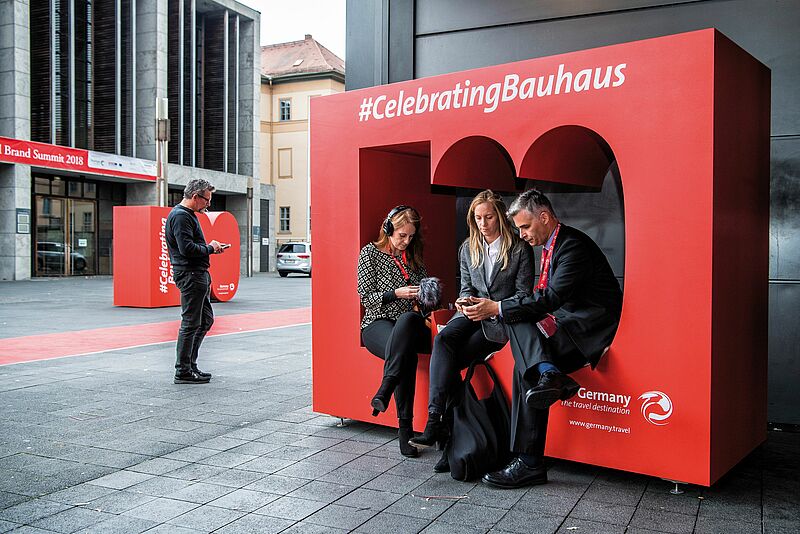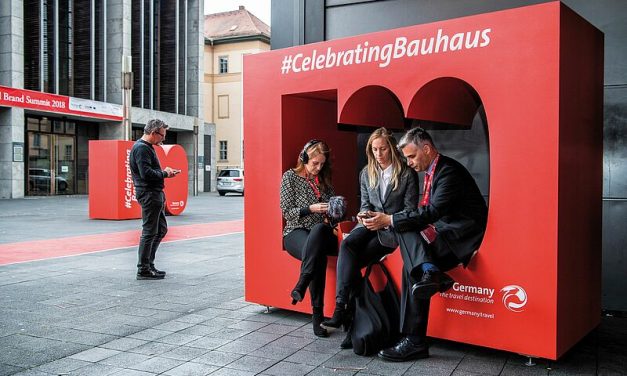Centenary. “The legacy of the Bauhaus movement plays a key role in the attractiveness of cultural tourism in Germany,” says Petra Hedorfer, CEO of the German National Tourist Board (GNTB). The centenary of the founding of Bauhaus in Weimar takes centre stage in the GNTB’s global theme-based campaign in 2019. Hedorfer is convinced of the innovative movement’s inspirational power. The second Incoming and Brand Summit of the GNTB in Weimar from 24 to 26 October 2018, the theme of which was “100 years of Bauhaus”, was a great success, attracting over 100 visitors from 20 countries.
The new Weimarhalle is celebrating its 20th anniversary in 2019, and the new Bauhaus Museum Weimar is opening in April. “We are right in the thick of it all,” enthuses Christiane Bock, Sales and Marketing Director of the Weimarhalle. Bock says many conference delegates will visit the museum, and conference organisers will be offering guided tours or Bauhaus walks through the city. “Bauhaus still seems fresh and modern. That makes it ideal for many clients, particularly associations in related fields and companies working in the construction industry or architecture. The Bauhaus centenary is clearly increasing this interest,” says Christiane Bock.
Throughout the country, events and exhibitions will be showcasing the innovative spirit of Bauhaus, which brings together art, craftsmanship and everyday life and in its manifesto of 1919 demanded that design should be subordinate to function. At the opening of the recent nine-day Bauhaus festival in Berlin on 16 January 2019, German President Frank-Walter Steinmeier praised Bauhaus as being “synonymous with modernity”. Although the German Bauhaus school was only operational for 14 years, its influence on architecture and design is still felt throughout the world. Centenary events are also taking place in Tel Aviv and Japan.
Iconic Bauhaus buildings are still the trademark of Dessau, where the movement was based from 1926 onwards. “A trip to Dessau will be very much worth it in 2019. The Bauhaus buildings will be linked by a dedicated bus service and a cycling route, and an integrated approach is being taken to presenting them. The festivals School Fundamental, Architecture Radical and Stage Total include fascinating colloquiums.In addition to conferences at the German Environment Agency, architecture and engineering associations are coming,” reports Guido Fackiner of the Dessau-Roßlau tourism association. A 100-day countdown is beginning in June with over 100 events until the opening of the Bauhaus Museum Dessau on 8 September 2019. All institutions around the world that collect Bauhaus design are expected in Dessau in December 2019 for Collecting Bauhaus.
The GNTB has come up with a “grand tour” of original German Bauhaus sites. The focus will also be on North Rhine-Westphalia (NRW), where the Bauhaus visionary Ludwig Mies van der Rohe worked. “Mies van der Rohe designed buildings for a new society. That is demonstrated impressively in Krefeld. His villas and the VerSeid AG factory, the only one he ever designed, have recently been renovated and resurrected and are open to visitors who want to discover Bauhaus,” says Dr Heike Döll-König, CEO of Tourismus NRW.
The name of Krefeld’s Seidenweberhaus theatre, which also runs the Yayla Arena, pays reference to the silk-weaving industry, which used to be so important to the city. At the end of 2018 the decision was taken to demolish the Seidenweberhaus. A new convention centre will be built in Krefeld. In the state capital Düsseldorf, the CCD Congress Center Düsseldorf will be opening an extension this year. The adjoining new Hall 1 will have a capacity of 10,000, and there will also be 6 conference rooms of 200 sqm each. The foyer offers over 2,000 sqm and can be used for events with up to 1,111 participants.
Bauhaus also left its mark in Düsseldorf. The Behrens-Haus, named after its architect Peter Behrens, was built in 1912 and has been bought by the state of NRW. It will shortly house a museum of the state’s history. Peter Behrens, who worked as an artistic adviser to AEG, is thought of as the initiator of corporate design. His student Ludwig Mies van der Rohe designed avant garde exhibition stands for his clients that caused a stir internationally.
Munich Creative Business Week (MCBW) from 9 to 17 March 2019 will be asking what we can learn from Bauhaus today. “The future comes from design” is the theme of the panel debate on the subject of Bauhaus 4.0. An exhibition, the title of which translates as “Radically modern” is part of the event, which attracted 78,000 people in 2018. It celebrates the visionary, thought-provoking nature of Bauhaus, which included gender parity: 50 per cent of the school’s students were women.
- Dessau’s iconic buildings can be booked for events. Photo: TVB Dessau-Rosslau























